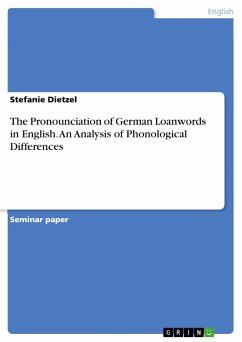Diplomarbeit aus dem Jahr 2011 im Fachbereich Englisch - Pädagogik, Didaktik, Sprachwissenschaft, Note: 1,0, Justus-Liebig-Universität Gießen (Institut für Englische Sprachwissenschaft), Sprache: Deutsch, Abstract: Can you think of an English loanword in German that originally contains the sounds/ð/ or / /? No? One might now spiteful say: luckily not! Jumping on the cliché thatGermans are not able to pronounce the th-sounds properly, this saves us a lot ofacoustic mishaps. Yet, meanwhile there do exist a few loanwords containing the apico-dental fricatives /ð/ or / /, as for example smoothie /'smu ði/ or thriller /' r l /.Still their proportion out of the total amount of English loans in German is vanishinglysmall.Bringing it to linguistic terms, these phonemes exclusively belong to the Englishphoneme inventory and do not constitute part of the German language system. Thereforethe research question of this thesis is: Do phonological features influence theborrowing of a foreign word?There are a lot of reasons for the adaptation of loanwords and many works in linguisticsdeal with them in great detail (cf. for example Holland 2007: 49ff; Fischer2008: 1ff).Speakers borrow words from other languages to fill gaps in their own lexical inventory.The reasons for such lexical gaps vary greatly: cultural innovation mayintroduce objects or actions that do not have a name in the native language; nativewords may be perceived as non-prestigious; names of foreign cities, institutions,and political figures which were once unknown may have entered the public eye;new words may be introduced for play, etc. (Calabrese and Wetzels 2009b: 1)Most discussions about the factors that influence the occurrence of a loanword goback to syntactic, lexical, semantic or social circumstances (cf. Fischer 2008: 1f).Having browsed many books about English loanwords, only few of them explicitlymentioned phonological features when talking about parameters determining the appearanceof loanwords. This study tries to fill this gap by investigating the phonologicalproperties of English loanwords in German.Being a study within English linguistics, the focus lies on the English etymonsthat are borrowed into German. With regard to borrowing, the term etymon can beequated with the terms root or source word since it is defined as lexical form from an earlier stage in the history of a word from which the modern word is derived (Nord 2002). [...]
Hinweis: Dieser Artikel kann nur an eine deutsche Lieferadresse ausgeliefert werden.
Hinweis: Dieser Artikel kann nur an eine deutsche Lieferadresse ausgeliefert werden.








